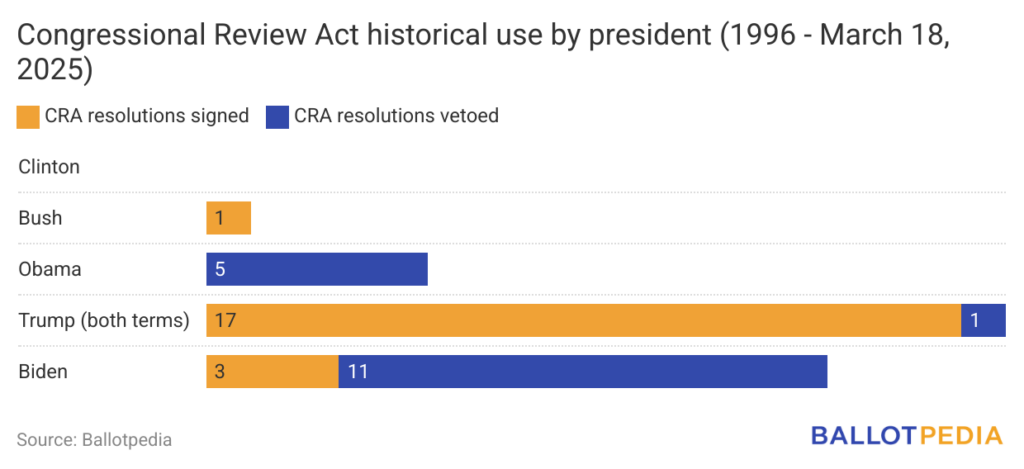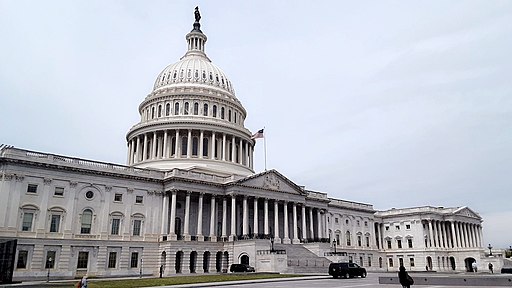What’s the story?
Both chambers of Congress passed the following two resolutions in early March to nullify Biden administration rules related to environmental and energy policy:
- House Joint Resolution 35 nullified the Environmental Protection Agency's (EPA) Waste Emissions Charge for Petroleum and Natural Gas Systems: Procedures for Facilitating Compliance, Including Netting and Exemptions rule. The rule implemented compliance measures through the Methane Emissions Reduction Program (MERP) enacted under the Inflation Reduction Act (IRA) of 2022. It increased fees on waste emissions that exceeded the legal limit.
- Senate Joint Resolution 11 targets the Bureau of Ocean Energy Management's (BOEM) Protection of Marine Archaeological Resources rule, which required archaeological reports for any oil and gas exploration or development plan that included the Outer Continental Shelf (OCS).
The resolutions of disapproval were sent to Trump's desk for his signature on March 4 and March 10, respectively. Trump had not yet signed the resolutions as of March 17. The 10-day window for Trump to act on H.J.R 35 ended on March 15 and the bill passed into law without his signature. He has until March 21 to act on S.J.R 11.
Concerning the waste emissions charge rule nullified by H.J.R. 35, Sierra Club’s Beyond Fossil Fuels director Mahyar Sorour argued that since the EPA is required under the IRA to implement these regulations, "forcing the agency to implement the charge some other way after conducting a thorough, well-researched process is as wasteful of taxpayer resources as these oil and gas operators are wasteful of harmful methane."
Amanda Eversole, executive vice president and chief advocacy officer for the American Petroleum Institute, said the rule implemented a "duplicative, punitive tax on American energy production that stifles innovation." Senate Environment and Public Works Committee Chairman Shelley Moore Capito (R) said that the committee is drafting legislation to include in a budget reconciliation bill to remove the statute authorizing the EPA to promulgate the rule.
Concerning the marine archeological resources rule targeted by SJR 11, BOEM Director Elizabeth Klein said in favor of the rule, “Improving reporting requirements will increase our ability to proactively identify marine archaeological resources and decrease the likelihood of unintentional damage caused by OCS activities. This step is necessary to ensure compliance with the National Historic Preservation Act, protect cultural heritage, and promote responsible development of offshore energy resources.”
Rep. Nick Begich (R-AK), who sponsored SJR 11 to nullify the rule, said, “By requiring costly archaeological reports before companies can even explore on the Outer Continental Shelf, this particular rule delayed investment, drove up costs, and discouraged the very production we need to achieve energy independence. I was proud to support this resolution to roll back yet another Biden-era regulation that locked up American energy producers."
What's the background?
The Congressional Review Act (CRA), a law passed in 1996, allows Congress to pass joint resolutions of disapproval to nullify new federal regulations created by government agencies.
The 119th (2025-2026) Congress has introduced 54 resolutions to overturn Biden-era regulations as of March 17, 2025. Six resolutions passed one chamber, and one (SJR11) passed both. One (HJR35) was enacted as of March 17.
Since the CRA was enacted in 1996, it has been used to repeal 21 rules. More than 500 joint resolutions were introduced between 1996 and March 2025, while over 109,000 federal rules were promulgated in that time.
The 21 approved resolutions of disapproval were signed by three presidents during terms succeeding a president from the opposing party:
- 1 - George W. Bush (R) signed the first resolution of disapproval in 2001.
- 16 - Donald Trump (R) (first term) signed 15 in 2017 and one in 2018.
- 3 - Joe Biden (D) signed three in 2021.
- 1 - Donald Trump (R) (second term) allowed one to pass into law without his signature in 2025 so far.

Presidents have vetoed 17 CRA resolutions. Click here to learn more about how the CRA has been used since its enactment.
Additional reading:


